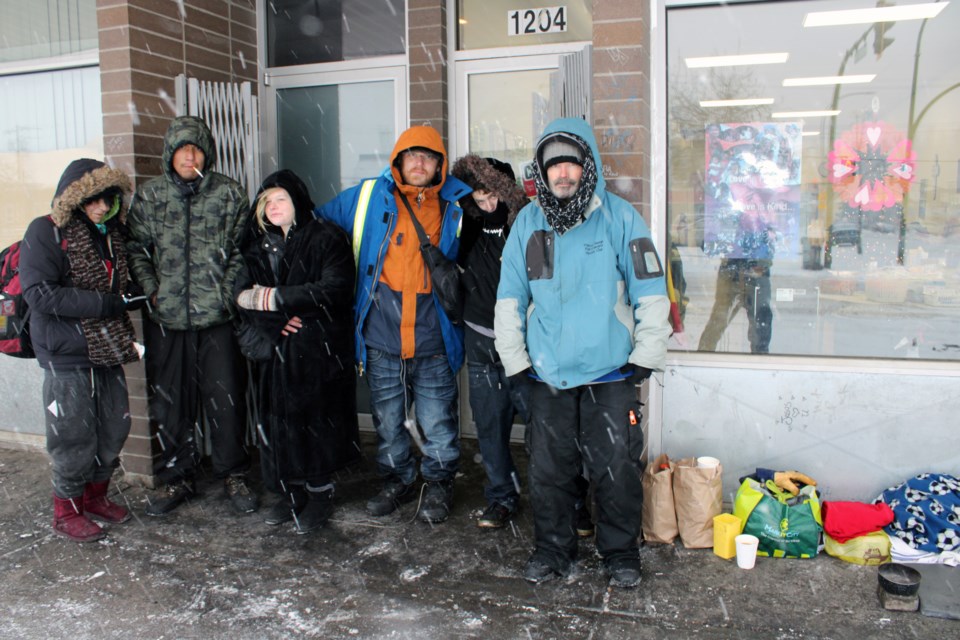No matter how bitter a Prince George winter gets.
No matter how thin his wallet may be.
And no matter how gut-wrenching it was to see his makeshift home and possessions go up in flame, Kurt Kriberg knows when he comes to the Vincent de Paul Drop-In Centre, a friendly face will be there to offer him a meal.
He doesn’t mind lining up with his buddies on the street when the door opens for breakfast, lunch and supper. He’s hopeful for a return of pre-pandemic days when there were enough volunteers to serve them their meals sitting at tables inside the warm building. But until that happens, he’s grateful for the takeout food someone has packed into a paper bag for him to eat out in the cold in front of the building on Second Avenue..
“If we don’t have this place, we’d have nowhere to eat,” said the 30-year-old Kriberg. “It helps us out and they’re good people here. It feeds a couple hundred people at least and the food is good. You get breakfast, you get lunch and you get sandwiches at 7 for supper.”
The drop-in centre survives on what donors provide and Kriberg often sees that charity in action.
“You’d be surprised how many people drop off stuff for people,” Kriberg said. “Last night, three people pulled up with meals and they were giving out gloves and scarves and clothes.”
Kriberg has been getting fed at the drop-in centre for six or seven years, not long after he left his rural home near Grande Prairie, Alta. He didn’t think when he arrived in Prince George he’d be living in tents or shelters, relying on social assistance cheques and getting his meals from charities, but that’s his reality.
“I had a good career (in construction) eight years ago and all these layoffs happened and I packed up and moved to the city,” he said. “I didn’t know anybody here and I lived in the back of my car and got a place, got it together and everything just went downhill. I lost my job again and haven’t been able to get myself up.”
He and his friends get called bums and druggies and face the derision of people who pass by on the streets who might think they’re up to no good. But Kriberg says he’s just trying to get by. He smokes a bit of weed but doesn’t use drugs or abuse alcohol.
“We’re people too. We walk, we talk, we’re just normal people, but we’re just in a bad situation and it’s hard to find a place,” he said.
“Why they look down on people like that is that some people are doing bad things and they make it look bad for us. People who aren’t homeless come down here and they start crap and give us a bad name.”
Kriberg has found a break from winter, sleeping at the Native Friendship Centre’s Second Avenue temporary shelter, half a block away from St. Vincent’s.
“Rents are ridiculous,” he said. “Even just to rent a room for a month it’s like 700 bucks. You can’t find a home with that kind of prices.
“(But) there’s a lot more people in worse situations than me.”
Kriberg was living in Tent Town, the homeless encampment at First Avenue and George Street until the evening of Nov. 19, when fire destroyed the wood shelter he’d built there.
“That was my house, somebody burnt my place down there,” said Kriberg. “I just came back and it was on fire, and I had bunch of propane bottles in there and they blew up. It was pretty bad. I just lost everything again when someone raided my house.”
Since the fire, he’s been rebuilding his temporary house. He’s framed the walls and hung up an insulated tarp to try to keep the cold out ,but someone ripped the tarp down to use for their own shelter. He’s hoping to get a roof on soon and build bunkbeds so it will sleep six.
‘I’m starting over again,” he said. “I went around to the businesses down here and asked if they had any spare lumber and people helped me out. I actually had brand-new lumber building this house and I did it all with a handsaw and a hammer and nails.
“Hopefully I’ll get settled in and actually have a place to come to, I’m a skilled labourer and if I can find work I’ll slowly get back on track. My dream is to build a house on a piece of property, so I started doing that down there.”



